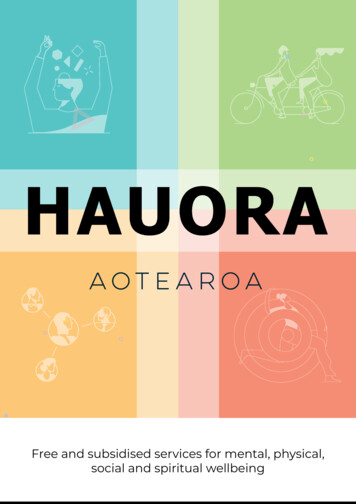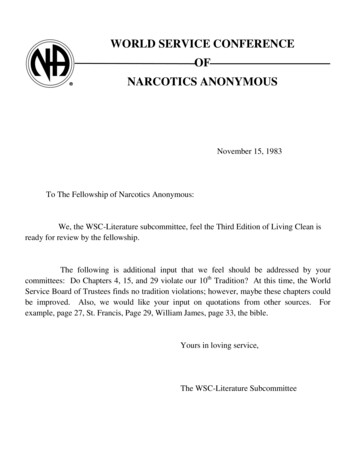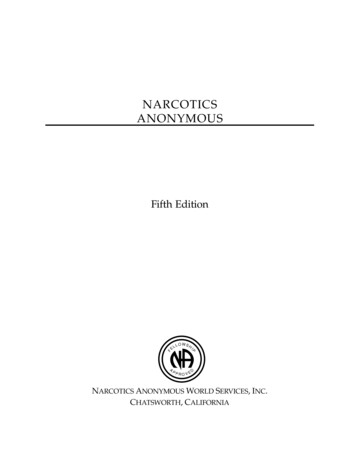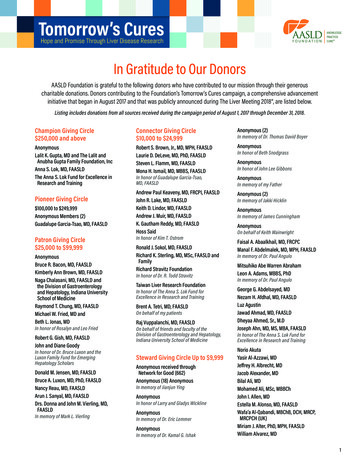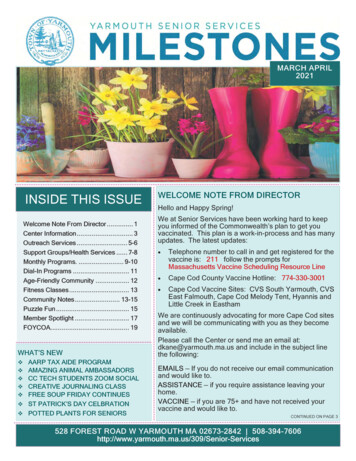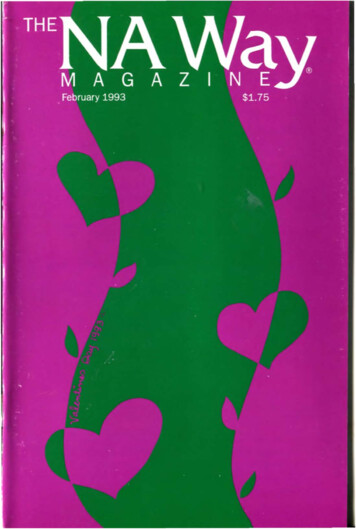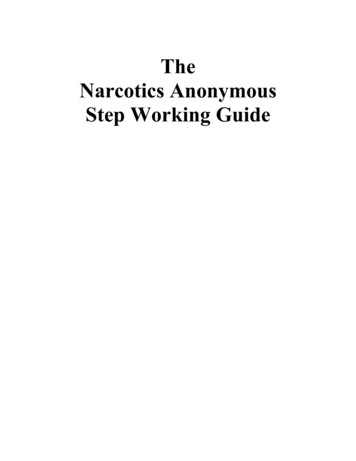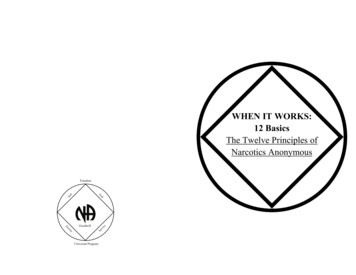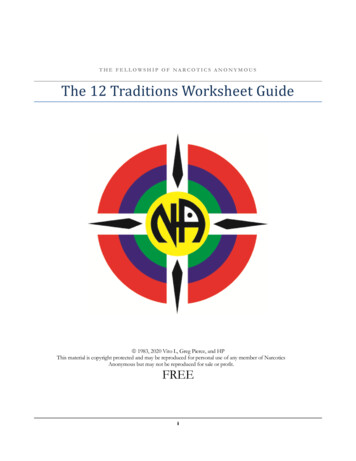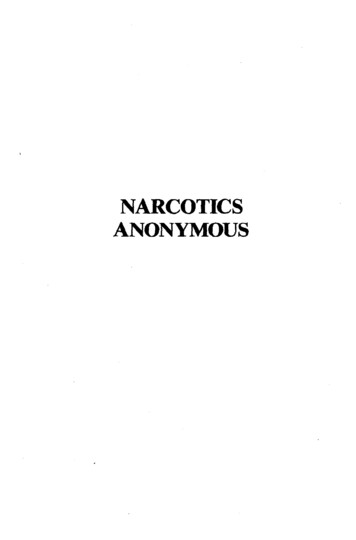
Transcription
NARCOTICSANONYMOUS
Copyright !982 by C.A.R.E.N.A Publishing Co.All rights reservedLibrary of Congress Catalog No. 83-70346ISBN 0-912075-00-7PRINTED IN THE UNITED STATES OF AMERICA
NARCOTICSANONYMOUSAPPROVEDUTERATURE12 Steps and 12 Traditionsreprinted for adaptionby permission ofA.A. World Services, Inc.
CONTENTSOur Symbol . , . , , . vilForeword. , . , . , . , . viiiIntroduction . . . . . xBOOK IChapter IWho Is An Addict?.1Chapter2What Is The N.A. Progrrun?. . . . . . . . . . . . . . . . . . . . . . . . . . . . . . .7Chapter3Why Are ""' Here? . . . . . . . . . . . . . . . . . . . . . . . . . . . . . . . . . . . . . . . . 11Chapter4HowltW.rks . 15Chapter5What Can I Do? . . . . . . . . . . . . . . . . . . . . . . . . . . . . . . . . . . . . . . . . . . . 49Chapter6The Twelve Traditionsof Narcotics Anonymous. . . . . . . . . . . . . . . . . . . . . . . . . . . . . . . . . . . 55Chapter?Recovery And Relapse . . . . . . . . . . . . . . . . . . . . . . . . . . . . . . . . . . . . . 71ChaptersWe Do Recover. . . . . . . . . . . . . . . . . . . . . . . . . . . . . . . . . . . . . . . . . . . . 81Chapter9Just For Today Living The Program . , . . . . . . . . . 87Chapter 10More Will Be Revealed . . . . . . . . . . . . . . . . . . . . . . . . . . . . . . . . . . . . . 95ii
We cannot change the nature ofthe Addict or Addiction .We can help to change the old lieuonce an addict, always an addict,,,by striving to make recovery moreavailable.God, help us to remember this difference.vi
OUR SYMBOLSimplicity is the keynote of our symbol; it follows the simplicity of ourFellowship. We could find all sorts of occult and esoteric connotations inthe simple outlines, but foremost in our minds were easily understoodmeanings and relationships.The outer circle denotes a universal and total program that has roomwithin for all manifestations of the recovering and wholly recoveredperson.The square, whose lines are defined, is easily seen and understood; butthere are other unseen parts of the symbol. The square base denotesGoodwill, the ground of both the Fellowship and the member of oursociety. Actually, it is the four pyramid sides which rise from this base ina three dimensional figure that are the Self, Society, Service and God.All rise to the point of Freedom.All parts thus far are closely related to the needs and aims of the addictseeking recovery and the purpose of the fellowship seeking to makerecovery available to all. The greater the base, as we grow in unity innumbers and in Fellowship, the broader the sides and the higher thepoint of freedom. Probably the last to be lost to freedom will be thestigma of being an addict. Goodwill is best exemplified in service andproper service is "Doing the right thing for the right reason." When thissupports and motivates both the individual and the Fellowship, we arefully whole and wholly free.FreedomFreedomSelf,, . .'' ./ : ,/,'' GodIf I I1 :II.'". Service"'I"' . ,' Goodwill-- """"--/'Universal ProgramUniversal Programvii
FOREWORDNarcotics Anonymous was formed in July 1953, with the first meetingheld in Southern California. The Fellowship grew erratically, but quicklyspread to various parts of the United States. From the beginning theneed was seen for a "book on recovery" to help strengthen the Fellowship. The pamphlet, "Narcotics Anonymous," was published in 1962.However, the Fellowship still had little structure and the 1960's were aperiod of struggle. Membership grew rapidly for a time, and then beganto decline. The need for a more specific direction was readily apparent.N .A. demonstrated its maturity in 1972, when a World Service Officewas opened in Los Angeles. The W.S.O. has brought the needed unityand sense of purpose to the Fellowship.The opening of the W.S.0. brought stability to the growth of theFellowship. Today, there are many thousand recovering addicts inhundreds of meetings all across the United States and in many foreigncountries. Today, the World Service Office truly serves a worldwideFellowship.Narcotics Anonymous has long recognized the need for a completeBasic Text on addiction-a book about addicts, by addicts and foraddicts.This effort was strengthened after the formation of W.S.O. with thepublication of The N.A. Tree, a pamphlet on service work. Thispamphlet was the original "service manual" of the Fellowship. It hasbeen followed by subsequent and more comprehensive volumes, andnow the N.A. Service Manual.The manual outlined a service structure which included a WorldService Conference. The W.S.C., in turn, included a LiteratureCommittee. With the encouragement of W. S.O., several members of theBoard of Trustees and the Conference, work began.As the cry for literature, particularly a comprehensive text, becamemore widespread, the W. S.C. Literature Committee developed. InOctober 1979, the first World Literature Conference was held at Wichita,Kansas, followed by conferences at Lincoln, Nebraska; Memphis,Tennessee; Santa Monica, California; Warren, Ohio; and Miami,Florida.viii
The W.S.C. Literature Subcommittee, working in conference and asindividuals, have collected hundreds of pages of material from membersand groups throughout the Fellowship. This material has been laboriously catalogued, edited, assembled, dismembered and reassembled.Dozens of area and regional representatives working with the Committee have dedicated thousands of man-hours to produce the work herepresented. But more importantly, those members have conscientiouslysought to insure a "group-conscience" text.In keeping with the spirit of anonymity, we, the W. S . LiteratureSubcommittee, feel it appropriate to express our special gratitude andappreciation to the Fellowship as a whole, especially the many of youwho contributed material for inclusion in the book. We feel that thisbook is a synthesis of the collective Group Conscience of the entire Fellowship and that every single idea submitted is included in the work, insome form or another.This volume is in.tended as a textbook for every addict seekingrecovery. As addicts, we know the pain of addiction, but we also knowthe joy of the recovery we have found in the Fellowship of NarcoticsAnonymous. We believe the time has come to share our recovery, inwritten form, with all who desire what we have found.Appropriately, this book is devoted to informing every addict: JUSTFOR TODAY, YOU NEVER HAVE TO USE AGAIN!Therefore,"With gratitude in our cleanliness, we dedicate our N.A. book to theloving service of our Higher Power. That through the development of aconscious contact with God, no addict seeking recovery need die withouthaving had a chance to find a better way of life."We remain trusted servants.In gratitude and loving service,LITERATURE SUBCOMMITTEEWORLD SERVICE CONFERENCENARCOTICS ANONYMOUSix
INTRODUCTIONThis book is the shared experience of the Fellowship of NarcoticsAnonymous. We welcome you to read this text, hoping that you willchoose to share with us in the new life we have found. We have by nomeans found a "cure" for addiction. We offer only a proven plan fordaily recovery.In N .A., we follow a program adapted from Alcoholics Anonymous.More than one million people have recovered in A. A., most of them justas hopelessly addicted to alcohol as we were to drugs. We are grateful tothe A.A. fellowship for showing us the way to a new life.The Twelve Steps of Narcotics Anonymous, as adapted from A.A.,are the basis of our recovery program. We have only broadened theirperspective. We follow the same path with a single exception; our identification as addicts is all-inclusive in respect to any mood-changing,mind-altering substance. "Alcoholism" is too limited a term for us; ourproblem is not a specific substance, it is a disease called "addiction." Webelieve that as a Fellowship, we have been guided by a Greater Consciousness, and are grateful for the Direction that has enabled us to buildupon an already-proven program of recovery.We have come to Narcotics Anonymous by various means and believethat our common denominator is that we failed to come to terms withour addiction. Because of the degree and variety of addiction foundwithin our Fellowship, we have approached the solution contained within this book in general terms. We pray that we have been searching andthorough, so that every addict who reads this volume will find the hopewe have found.Based on our experience, we believe that every addict, including the"potential" addict, suffers from an incurable disease of body, mind andspirit. We were in the grip of a hopeless dilemma, the solution of which isspiritual in nature. Therefore, this book will deal with spiritual matters.x
We are not a religious organization. Our program is a set of spiritualprinciples through which we are recovering from a seemingly hopelessstate of mind and body. Throughout the compiling of this work, we haveprayed:"GOD, grant us knowledge that we may write according to Your Divine precepts, instill in us a sense of Yourpurpose, make us servants of Your will and grant us abond of selflessness that this may truly be Your work, notours, in order that no addict, anywhere, need die from thehorrors of addiction."Everything that occurs in the course of N.A. service must be motivatedby the desire to more successfully carry the message of recovery to theaddict who still suffers. It was for this reason that we began this work.We must always remember that as individual members, groups, andservice committees, we are not, and should never be, in competition witheach other. We work separately and together to help the newcomer andfor our common good. We have learned, painfully, that internal strifecripples our Fellowship; it prevents us from providing the servicesnecessary for growth.It is our hope that this book will help the suffering addict find thesolution we have found. Our purpose is to remain clean, just for today,and to carry the message of recovery.Thank you,LITERATURE SUBCOMMITTEEWORLD SERVICE CONFERENCENARCOTICS ANONYMOUSxi
Many books have been writtenabout the nature of addiction. Thisbook primarily concerns itself withthe nature of recovery. If you arean addict and have found thisbook, please give yourself a breakand read it!xii
BOOK ONENARCOTICS ANONYMOUSxiii
Chapter OneWHO IS AN ADDICT?Most of us do not have to think twice about this question. WEKNOW! Our whole life and thinking is centered in drugs in one form oranother, the getting and using and finding ways and means to get more.We use to live and live to use. Very simply an addict is a man or womanwhose life is controlled by drugs. We are people in the grip of a continuing and progressive illness whose ends are always the same: jails, institutions and death.Those of us who have found the program of Narcotics Anonymous donot have to think twice about the question: Who is an addict? We know!The following is our experience.As addicts, we are people whose use of any mind-altering, moodchanging substance causes a problem in any area of life. Addiction is adisease which involves more than simple drug use. Some of us believethat our disease was present long before the first time we used.Most of us did not consider ourselves addicted before coming to theNarcotics Anonymous program. The information available to us camefrom misinformed people. As long as we could stop using for a while, wethought we were all right. We looked at the stopping, not the using. As
our addiction progressed, we thought of stopping less and less. Only indesperation did we ask ourselves, "Could it be the drugs?"We did not choose to become addicts. We suffer from a disease whichexpresses itself in ways that are anti-social and make detection, diagnosisand treatment difficult.Our disease isolated us from people except for the getting, using andfinding ways and means to get more. Hostile, resentful, self-centeredand self-seeking, we cut ourselves off from the outside world. Anythingnot completely familiar became alien and dangerous. Our world shrankand isolation became our life. We used in order to survive. It was theonly way of life we knew.Some of us used, misused and abused drugs and still never consideredourselves addicts. Through all of this, we kept telling ourselves, "I canhandle it.'' Our misconceptions about the nature of addiction conjuredup visions of violence, street crime, dirty needles and jail.When our addiction was treated as a crime or moral deficiency, we be-came rebellious and were driven deeper into isolation. Some of the highsfelt great, but eventually the things we had to do in order to support ourusing reflected desperation. We were caught in the grip of our disease.We were forced to survive any way we could. We manipulated peopleand tried to control everything around us. We lied, stole, cheated andsold ourselves. We had to have drugs, regardless of the cost. Failure andfear began to invade our lives.One aspect of our addiction was our inability to deal with life on itsterms. We tried drugs and combinations of drugs in an effort to copewith a seemingly hostile world. We dreamed of finding a magic formulathat would solve our ultimate problem-ourselves. The fact was that wecould not .successfully use any mind-altering or mood-changing substance, including marijuana and alcohol. Drugs ceased to make us feelgood.At times, we were defensive about our addiction and justified ourright to use, especially when we had "legal prescriptions.'' We wereproud of the sometimes illegal and often bizarre behavior that typifiedour u ing. We "forgot" the times we sat alone consumed by fear andself-pity. We fell into a pattern of selective thinking. We only remem2
bered the "good" drug experiences. We justified and rationalized thethings we had to do to keep from being sick or going crazy. We ignoredthe times when life seemed to be a nightmare. We avoided the reality ofour addiction.Higher mental and emotional functions, such as conscience and theability to love, were sharply affected by our use of drugs. Living skillswere reduced to the animal level. Our spirit was broken. The capacity tofeel human was lost. This seems extreme, but many of us have been inthis state.We were constantly searching for "the answer" -that person, placeor thing that would make everything all right. We lacked the ability tocope with daily living. As our addiction caught up with us, many of usfound ourselves in and out of institutions.These experiences indicated there was something wrong with our lives.We wanted an easy way out and some of us thought of suicide. Ourattempts were usually feeble, and only helped to contribute to ourfeelings of worthlessness. We were trapped in the illusion of "what if,""if only" and "just one more time." When we did seek help, we werereally only looking for the absence of pain.We have regained good physical health many times, only to lose it byusing again. Our track record shows that it is impossible for us to usesuccessfully. No matter how well we may appear to be in control, usingdrugs always brings us to our knees.Like other incurable diseases, addiction can be arrested. We agree thatthere is nothing shameful about being an addict, provided we accept ourdilemma honestly and take positive action. We are willing to admitwithout reservation that we are allergic to drugs. Common sense tells usthat it would be insane to go back to the source of our allergy. Our experience indicates that medicine cannot cure'' our illness.Although physical and mental tolerance play a role, many drugsrequire no extended period of use to trigger allergic reactions. Our reac11tion is what makes us addicts, not how much we use.Many of us did not think we had a problem until the drugs ran out.Even when others told us we had a problem, we were convinced that wewere right and the world was wrong. We used this belief to justify our3
self-destructive behavior. We developed a point of view that enabled usto pursue our addiction without concern for our own well-being or thatofothers. We began to feel the drugs were killing us long before we couldever admit it to anyone else. We noticed that if we tried to stop using, wecouldn't. We suspected we had lost control over the drugs and had nopower to stop.Certain things followed as we continued to use. We became accustomed to a state of mind common to addicts. We forgot what it was likebefore we started using; we forgot the social graces. We acquired strangehabits and mannerisms. We forgot how to work; we forgot how to play;we forgot how to express ourselves and show concern for others. We forgot how to feel.While using, we lived in another world. We experienced only periodicjolts of reality to self-awareness. It seemed we were at least two peopleinstead ofone, like Dr. Jekyll and Mr. Hyde. We ran around trying to getour lives together before our next run. Sometimes we could do this verywell, but later, it was less important and more impossible. In the end, Dr.Jekyll died and Mr. Hyde took over.Each of us has a few things we can say we never did. We cannot letthese things become excuses to use again. Some of us feel lonely becauseof differences between us and other members, and this makes it difficultto give up old connections and old habits.We all have different tolerances for pain. Some addicts needed to go togreater extremes than others. Some of us found we had had enoughwhen we realized that we were getting high too often and it was affectingour daily lives.At first, we were using in a manner which seemed to be social or atleast controllable with little indication of the disaster which the futureheld for us. At some point, our using became uncontrollable and antisocial. This began when things were going well and we were in situationsthat allowed us to use frequently. This was usually the end of the goodtimes. We may have tried to moderate, substitute, or even stop using, butwe went from a state of drugged success and well-being to complete spiritual, mental and emotional bankruptcy. Thi! : rate of decline varies fromaddict to addict. Whether it is years or days, it is all downhill. Those of4
us who don't die from the disease will go on to prison, mental institutions or complete demoralization as the disease progresses.Drugs had given us the feeling that we could handle whatever situationmight develop. We became aware, however, that drugs were largelyresponsible for having gotten us into our very worst predicaments. Someof us may spend the rest of our lives in jail for a drug-related crime or acrime commited while using.We had to reach our bottom before we became willing to stop. Wewere much more motivated to seek help in the latter stage of our addiction. It was easier for us to see the destruction, disaster and delusion ofour using. It was harder to deny our addiction when problems werestaring us in the face.Some of us first saw the effects of addiction on the people with whomwe were close. We were very dependent on them to carry us emotionallythrough life. We felt angry, disappointed and hurt when they had otherinterests, friends and loved ones. We regretted the past, dreaded the future, and we weren't too thrilled about the present. After years ofsearching, we were more unhappy and less satisfied than when it allbegan.Our addiction had enslaved us. We were prisoners of our own mind,condemned by our own guilt. We had given up ever stopping. Ourattempts to stay clean had always failed, causing us pain and misery.As addicts, we have an incurable disease called addiction which ischronic, progressive and fatal. However, it is a treatable disease. We feelthat each individual alone has to answer the question, "Am I anaddict?" How we got the disease is of no immediate importance to us.We are concerned with recovery.We begin to treat our addiction by not using. Many of us soughtanswers but failed to find any workable solution until we found eachother. Once we identify ourselves as addicts, help becomes possible. Wecan see a little of ourselves in every addict and a little bit of them in us.This insight lets us help one another. Our futures seemed hopeless untilwe found clean addicts who were willing to share with us. Denial of ouraddiction was what had kept us sick, and our honest admission enabledus to stop using. The people of Narcotics Anonymous told us that they5
were recovering addicts who had learned to live without drugs. If theycould do it, so could we.The only alternatives to recovery are jails, institutions, dereliction anddeath. Unfortunately, our disease makes us deny our addiction. If youare an addict, you too can find a new way of life through the N.A. program that would not otherwise be possible. We have become very grateful in the course of our recovery. Our lives have become useful, throughabstinence and by working the Twelve Steps of Narcotics Anonymous.We realize that we are never cured and carry the disease within us allour lives. We have a disease from which we do recover. Each day we aregiven another chance. We are convinced that there is only one way for usto live, and that is the N .A. way.6
Chapter TwoWHAT IS THE N .A. PROGRAM?N.A. is a non-profit fellowship or society of men and women forwhom drugs had become a major problem. We are recovered addictswho meet regularly to help each other stay clean. This is a program ofcomplete abstinence from all drugs. There is only "one" requirementfor membership, the honest desire lo slop using. There are no musts inN.A., but we suggest that you keep an open mind and give yourself abreak. Our program is a set of principles, written so simply that we canfollow them in our daily lives. The most important thing about them isthat "They Work."There are no strings attached to N.A. We are not affiliated with anyother organizations, we have no leaders, no initiation fees or dues, nopledges to sign, no promises to make to anyone. We are not connectedwith any political, religious, or law enforcement groups, and are underno surveillance at any time. Anyone may join us regardless of age, race,color, creed, religion or lack of religion.We are not interested in what or how much you used or who your connections were, what you have done in the post, how much or how littleyou havt:, but only in what you want to do about your prob/en1 and howwe can help. The newcomer is the most important person at any meeting,7
because we can only keep what we have by giving it away. We havelearned from our group experience that those who keep coming to ourmeetings regularly stay clean.Narcotics Anonymous is a Fellowship of men and women who arelearning to Jive without drugs. We are a non-profit society, and have nodues or fees of any kind. Each of us has paid the price of membership.We have paid dearly with our pain for the right to recover.We are addicts, surviving against all odds, who meet regularlytogether. We respond to honest sharing and listen to the stories of ourmembers for the message of recovery. We realize that, at last, there ishope for us.We make use of the tools that have worked for other recoveringaddicts who have learned to live without drugs in Narcotics Anonymous.The Twelve Steps are positive tools that make recovery possible. Our primary purpose is to stay clean and to carry the message to the addict whostill suffers. We are united by our common problem of addiction. Bymeeting, talking with, and helping other addicts, we are able to stayclean. The newcomer is the most important person at any meeting because we can only keep what we have by giving it away.Narcotics Anonymous has had many years of experience with literallyhundreds of thousands of addicts. This mass of intensive first-handexperience in all phases of illness and recovery is of unparalleled therapeutic value. We are here to share freely with any addicts who want it.Our message of recovery is based on our own experience. Beforecoming to the Fellowship, we exhausted ourselves trying to uuse" suc-cessfully, or trying to find out what was wrong with us. After comingto N.A., we found ourselves among a very special group of people whohave suffered like us and found recovery. In their experiences, freelyshared, we found hope for ourselves. If the Program worked for them, itwould work for us.The only requirement for membership is a desire to stop using. Wehave seen the Program work for any addict who honestly and sincerelywants to stop. We don't have to be clean when we get here, but after thefirst meeting, we suggest that newcomers keep coming back and come8
back clean. We don't have to wait for an overdose, or jail sentence, toget help from Narcotics Anonymous, nor is addiction a hopeless condition from which there is no recovery.We meet addicts like ourselves who are clean. We watch and listen tothem and realize that they have found a way to live and enjoy life without drngs. We don't have to settle for the limitations of the past. We canexamine and re-examine all our old ideas and constantly improve onthem or replace them with new ones. We are men and women who havediscovered and admitted that we are powerless over our addiction. Whenwe use, we lose.When we discovered that we cannot live with or without drngs, wesought help through N.A. rather than prolong our suffering. The Program works a miracle in our lives. We become different people. Thesteps and abstinence give us a daily reprieve from our self-imposed lifesentences. We become free to live.We want the place where we recover to be a safe place. free from out-side influences. For the protection of the Fellowship, we insist that nodrngs or paraphernalia be brought to any meeting.We feel totally free to express ourselves within the Fellowship, becauseno law enforcement agencies are involved. Our meetings have an atmosphere of empathy. In accordance with the principles of recovery, we trynot to judge, stereotype or moralize with each other. We are notrecruited and it doesn't cost anything. N .A. does not provide counselingor social services.Our meetings are a process of identification, hope and sharing. Theheart of N.A. beats when two addicts share their recovery. What we dobecomes real for us when we share it. This happens on a larger scale inour regular meetings. A meeting is two or more addicts gathered together to help each other stay clean.At the beginning of the meeting, we read N .A. literature which isavailable to anyone. Some meetings have speakers, topic discussions orboth. Closed meetings are for addicts or those who think they mighthave a drng problem; open meetings welcome anyone wishing to experience ou:r- PelloW"ship. The atmosphere of recovery is orotected by ourTwelve Traditions. We are fully self-supporting through voluntary9
contributions from our members. Regardless of where the meeting takesplace, we remain unaffiliated. Meetings provide us witb a place to bewitb fellow addicts. All we need are two addicts, caring and sharing, tomake a meeting.We let new ideas flow into us. We ask questions. We share what wehave learned about living without drugs. Though tbe principles of theTwelve Steps may seem strange to us at first, the most important thingabout them is that they work. Our Program is, in fact, a way of life. Welearn the value of such spiritual principles as surrender, humility and service from reading the N .A. literature, going to meetings, and workingthe steps. We find that our lives steadily improve, if we maintain abstinence from mind-altering, mood-changing chemicals and work theTwelve Steps to sustain our recovery. Living this Program gives us a relationship with a Power greater than ourselves, corrects defects, leads us tohelp others, and where there has been wrong, teaches us the spirit of forgiveness.Many books have been written about the nature of addiction. Thisbook concerns itself with the nature of recovery. If you are an addict andhave found this book, please give yourself a break and read it.10
Chapter ThreeWHY ARE WE HERE?Before coming to the fellowship of N.A., we could not manage ourown lives. We could not live and enjoy life as other people do. We had tohave something different and we thought we had found it in drugs. Weplaced their use ahead of the welfare of our families, our wives,husbands, and our children. We had to have drugs at all costs. We didmany people great harm but most of all we harmed ourselves. Throughour inability to accept personal responsibilities we were actually creatingour own problems. We seemed to be incapable offacing life on its ownterms.Most of us realized, that in our addictions, we were slowly committingsuicide, but such cunning enemies of life are narcotics and sedation thatwe had lost the power to do anything about it. Jail did not help us at all.Medicine, religion and psychiatry seemed to have no answers for us thatwe could use. All these methods having failed for us, in desperation, wesought help from each other in Narcotics Anonymous.After coming to N.A. we realized we were sick people who sufferedfrom a disease like Alcoholism, Diabetes or Tuberculosis. There is noknown "cure" for these-all, however, can be arrested at some pointand urecaYery" is then p0 ible.In N.A. we follow a program borrowed from Alcoholics Anonymous.11
In the last forty years, more than one million people have recovered inA.A., most of them just as hopelessly addicted to alcohol as we were todrugs. We are deeply grateful to the A.A. Fellowship for pointing theway for us to a new way of life.We are addicts seeking recovery. We used drugs to cover up our feelings, and did whatever was necessary to get them. Many of us woke upsick, unable to make it to work, or went to work loaded. Many of usstole to support our habit. We hurt the ones we loved. We d
In N .A., we follow a program adapted from Alcoholics Anonymous. More than one million people have recovered in A. A., most of them just as hopelessly addicted to alcohol as we were to drugs. We are grateful to the A.A. fellowship for showing us the way to a new life. The Twelve Steps of Narcotics Anonymous, as adapted from A.A.,
